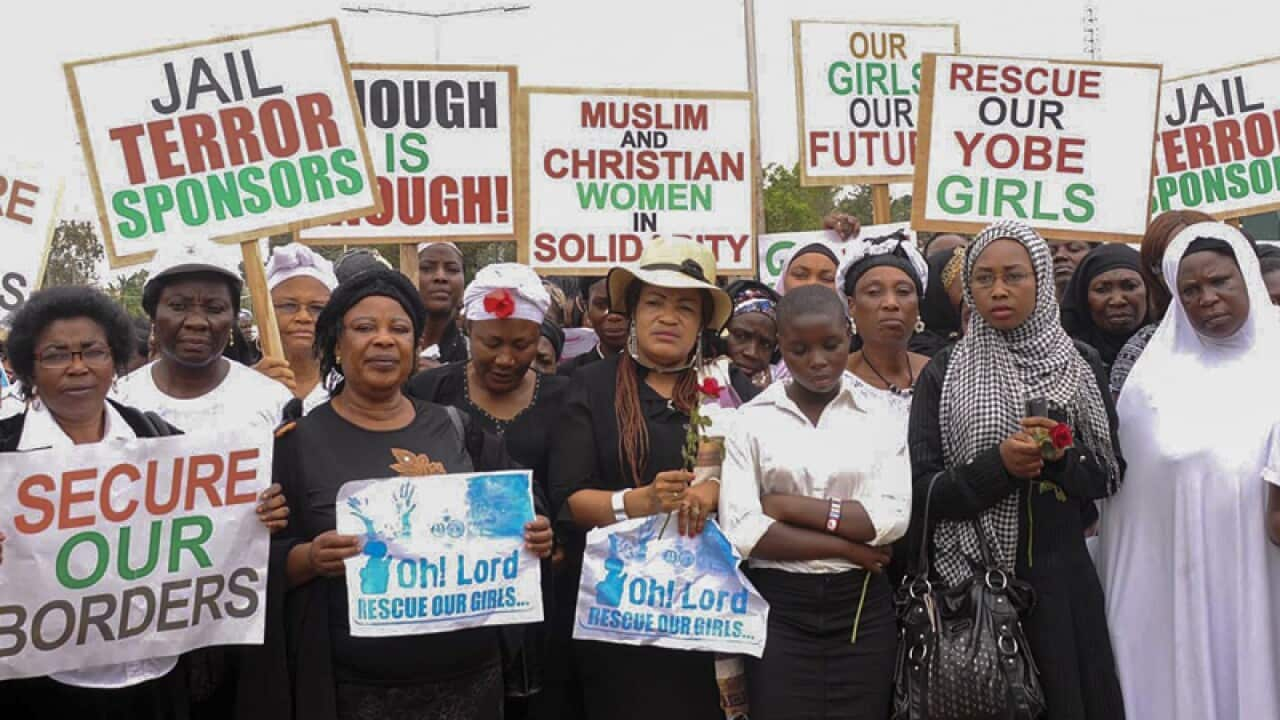Nigeria's president says Boko Haram's mass abduction of more than 200 schoolgirls will mark a turning point in the battle against the Islamists, as world powers joined the search to rescue the hostages.
President Goodluck Jonathan's administration has struggled to contain Boko Haram's bloody five-year uprising and experts have questioned whether Nigeria can end the violence without help.
"I believe that the kidnap of these girls will be the beginning of the end of terror in Nigeria," Jonathan told delegates at the World Economic Forum, thanking Britain, China, France and the US for their offers of help to rescue the hostages.
The four world powers have pledged varying levels of assistance to track down the girls whose April 14 mass abduction from a school in Chibok in northeastern Borno state has sparked global outrage.
Jonathan's comments echoed those of US President Barack Obama earlier in the week.
Obama said the Chibok kidnappings "may be the event that helps to mobilise the entire international community to finally do something against this horrendous organisation".
The abductions have also led to a growing social media campaign with the hashtag #BringBackOurGirls joined by public figures and celebrities.
"Our prayers are with the missing Nigerian girls and their families. It's time to #BringBackOurGirls," wrote US First Lady Michelle Obama under a picture retweeted more than 48,000 times.
US actress Angelina Jolie on Thursday blamed a "culture of impunity" for the kidnapping, adding that the world had to "make sure this stops happening and that this is not something that people feel they can get away with..."
The Vatican has also condemned the "terrorists" with spokesman Federico Lombardi saying it was "the latest of the horrible acts of violence that have characterised the activity of this group in Nigeria for a long time.
"The total lack of respect for life and for human dignity, including for the most innocent, vulnerable and defenceless people demands an extremely firm condemnation," Lombardi said on Vatican radio.
"This evokes compassion filled with sadness for the victims, horror for the spiritual and physical suffering and for the incredible humiliations that they are being subjected to," Lombardi said.
Most of the insurgents' recent attacks have targeted the remote and impoverished northeast, but two car bombings on the outskirts of the capital Abuja in the last month underscored the grave threat the Islamists pose.
Jonathan had hoped that the World Economic Forum would highlight Nigeria's economic progress and its recent emergence as Africa's top economy, but headlines have remained focused on Boko Haram.
Holding the summit in Abuja despite the recent violence amounted to victory over the extremists, the Nigerian leader said.
"If you had refused to come because of fear the terrorist would have jubilated," he told the more than 1000 delegates from over 70 countries.
In the latest massacre by the Islamists - which was confirmed by Jonathan's office on Thursday, three days after news of the attack emerged - hundreds of people were killed in the town of Gamboru Ngala, also in Borno, Boko Haram's historic stronghold.
Nigeria has typically resisted security cooperation with the West, which analysts say has hampered efforts against the militants who have killed thousands since 2009.
American officials have acknowledged that the US military had relatively weak ties with Nigeria and unlike many other African states, the government in Abuja has shown little interest in major training programs.
Some have voiced hope that collaborating on the hostage rescue may improve Nigeria's broader capacity to defeat Boko Haram.
Washington plans to send a team of military personnel as well as specialists from the Justice Department and the FBI, US officials said.
Britain said it will send experts in planning and co-ordination, France has offered a specialist team, while China said it would provide intelligence support and relevant satellite imagery.
On the sidelines of the World Economic Forum, Jonathan on Thursday met with the US ambassador to Nigeria, James Entwistle, "to discuss modalities for the actualisation of the offer made by President Barack Obama to assist Nigeria in rescuing the girls", a statement from his office said.
UN Secretary-General Ban Ki Moon also spoke with Jonathan on the phone and assured him of the organisation's readiness to help Nigeria in the rescue of the girls.
Fatou Bensouda, prosecutor of the International Criminal Court, said in a statement that "no stone should be left unturned to bring those responsible for such atrocious acts to justice either in Nigeria or at the ICC".
Share

